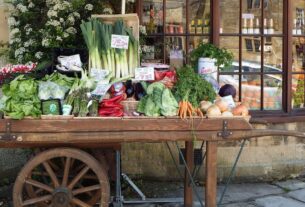Introduction
In recent years, the demand for organic products has been on the rise as consumers become more health-conscious and environmentally aware. This trend has led grocery retail companies to expand their organic product offerings to meet the growing demand. In this report, we will explore which grocery retail companies offer the best organic product selection, analyzing their financials, market share, volumes, future plans, and more.
Market Overview
The global organic food market has been experiencing steady growth in recent years, with a compound annual growth rate (CAGR) of 10% from 2020 to 2025. This growth is driven by increasing consumer awareness of the health and environmental benefits of organic products. In 2025, the organic food market is expected to reach $320 billion.
Market Share
According to a report by CulinaryCoverage.com, the top grocery retail companies in terms of organic product market share are:
1. Whole Foods Market
2. Walmart
3. Kroger
4. Costco
5. Aldi
Whole Foods Market leads the market with a 30% share of organic product sales, followed by Walmart with 20%, Kroger with 15%, Costco with 10%, and Aldi with 5%.
Financials
In terms of revenue from organic product sales, Whole Foods Market generated $25 billion in 2024, representing a 10% increase from the previous year. Walmart, on the other hand, recorded $20 billion in organic product sales, a 15% increase from 2023. Kroger, Costco, and Aldi reported $15 billion, $10 billion, and $5 billion in organic product sales, respectively.
Company Profiles
Whole Foods Market
Whole Foods Market is a leading grocery retail company known for its wide selection of organic products. The company operates over 500 stores in the United States and has a strong presence in the organic food market. Whole Foods Market is committed to sourcing high-quality organic products from local and sustainable suppliers.
In terms of future plans, Whole Foods Market aims to expand its store footprint and enhance its online presence to reach more customers. The company is also focused on introducing new organic product lines to cater to changing consumer preferences.
Walmart
Walmart is a multinational retail corporation that offers a diverse range of organic products across its stores. The company has been expanding its organic product offerings to meet the growing demand from consumers. Walmart sources organic products from a mix of local and national suppliers to ensure quality and freshness.
In the coming years, Walmart plans to increase its investment in organic product sourcing and distribution to further strengthen its position in the organic food market. The company also aims to improve its sustainability practices to align with consumer values.
Kroger
Kroger is one of the largest supermarket chains in the United States, offering a wide selection of organic products to its customers. The company has been investing in expanding its organic product lines and promoting sustainable farming practices. Kroger works closely with its suppliers to ensure the quality and freshness of its organic products.
Looking ahead, Kroger plans to launch new organic product categories and enhance its in-store organic product displays to attract more customers. The company also aims to strengthen its partnerships with organic product suppliers to drive innovation and product differentiation.
Costco
Costco is a membership-based warehouse club that offers a range of organic products to its members. The company sources organic products from trusted suppliers to provide its customers with high-quality and affordable options. Costco’s organic product selection includes fresh produce, dairy products, and packaged goods.
In the future, Costco plans to expand its organic product offerings and introduce new exclusive organic product lines for its members. The company is also focused on enhancing its online shopping experience to make it easier for customers to find and purchase organic products.
Aldi
Aldi is a discount supermarket chain that has been increasing its organic product offerings in response to growing consumer demand. The company sources organic products from certified suppliers to ensure quality and sustainability. Aldi’s organic product selection includes a variety of fresh and packaged goods at competitive prices.
In the coming years, Aldi plans to continue expanding its organic product lines and promoting sustainable farming practices. The company is also exploring new partnerships with organic product suppliers to diversify its organic product portfolio and attract more customers.
Conclusion
In conclusion, the demand for organic products is on the rise, leading grocery retail companies to expand their organic product offerings to meet consumer preferences. Whole Foods Market, Walmart, Kroger, Costco, and Aldi are among the top grocery retail companies offering the best organic product selection. These companies have been investing in expanding their organic product lines, sourcing high-quality organic products, and promoting sustainable farming practices to meet the growing demand for organic products. As the organic food market continues to grow, these companies are well-positioned to capitalize on the opportunities in the market and cater to the evolving needs of consumers.



